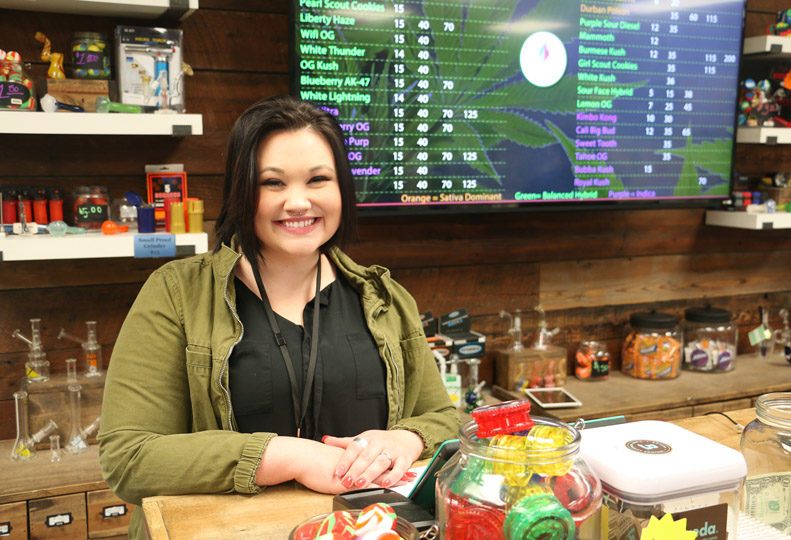
Home » Marijuana sales jump 162 percent in Spokane County
Marijuana sales jump 162 percent in Spokane County
Only King County topped volume here across state

February 2, 2017
Spokane County’s marijuana retail sales jumped 162 percent in Washington state’s 2016 fiscal year, compared with prior-year volume, according to reports from the state Liquor and Cannabis Board.
The WSLCB reported retail sales came to $502 million statewide, with $186 million collected in taxes, for the state’s 2016 fiscal year, which ended last June 30. Of the $502 million total, Spokane County reported $57.6 million in retail sales, a 162 percent increase from its 2015 retail sales total of $22.1 million.
The 2016 countywide sales generated $21.3 million in taxes.
Total sales placed Spokane County behind only King County, which had retail sales total of $151 million for 2016.
The Washington State Liquor and Cannabis Board reported $973 million in total marijuana sales for the state’s 2016 fiscal year. In addition to retail sales, the $973 million figure includes sales from producers to processors and sales from processors to retailers, neither of which are taxed. That total is about 274 percent higher than the 2015 amount, which came in at $260 million.
WSLCB data shows sales in the first half of the 2017 fiscal year are already approaching the 2016 total, with $884 million in sales so far and $165 million collected in taxes.
Two Spokane marijuana retailers, Greenlight at 10309 E. Trent and neighboring shop Sativa Sisters at 10525 E. Trent, were listed as having some of the top sales in the state, ranking eighth and 10th, respectively. Those two shops held first and second place last year in a ranking of top-selling retailers in Spokane County, with $7.4 million and $6.9 million in sales, respectively.
The Journal was unable to reach Greenlight representatives for comment on its top-sales ranking.
Meanwhile, Sativa Sisters General Manager Eric Skaar says he’s excited to see the shop rank so high in sales within the county.
“I think what you get here is great value,” says Skaar. “Our products aren’t overly pricy, but they’re not too cheap either. Our staff is also very educated on the industry, keeping up with the latest research and science aspects.”
Skaar says the shop also carries a medical endorsement, with a majority of its 17 retail staff having taken courses to become certified medical marijuana consultants. While he says most customers are over 40, the shop sees a variety of traffic, with many different product interests.
“Usually people come in having heard about us being a good place for first-timers to visit, gain some knowledge, and try something new,” he says.
Other shops that fell within the top retailers in Spokane County include Satori and Cinder, two shops that operate multiple locations.
Taylor Olson works as a brand ambassador for Satori’s north location, at 9301 N. Division. He says part of what makes the shop so popular with its customers is the passion its 20 staff members have for the products they’re selling.
“We try for a unifying experience here,” says Olson. “We’re trying to change the stigma surrounding cannabis and create a place where people can feel comfortable.”
While the Satori north location and its South Hill store, at 2804 E. 30th, both offer a variety of cannabis products, Olson says some of the newer ideas such as infused drinks and canna-cigars are popular right now.
“People entrust us with their experience, so we want to make sure it’s a quality level from purchase to consumption,” he says. “We’re so thankful to our customers and always enjoy hearing feedback.”
Becca Johnson is the district manager for Spokane’s two Cinder locations, one at 7011 N. Division that has 13 employees and the other at 1421 N. Mullan Road, which employs 18 people.
She says she agrees that an educated staff and quality product are the deciding factors to achieve success in the cannabis retail industry.
“Everyone I know who works in this industry is so excited to be here,” she says. “These are driven, motivated individuals.”
One of the things Johnson says she’s still surprised by is how common cannabis use is.
“People are surprisingly open minded and willing to try new products, something different than your typical joint,” she says. “We get customers from all walks of life, so we try to be a place for everyone, not just one type of person.”
The WSLCB offers four types of marijuana licenses: producer, processor, retailer, and transporter. Currently, it lists 142 producer licenses, 151 processor licenses, 157 retailer licenses, and four transporter licenses in Spokane County.
Mikhail Carpenter, spokesman for the WSLCB, says the number of licensees continues to grow as the board continues to process applications.
Carpenter says there is no limit on the number of producer and/or processor licenses, nor is there a limit on how many can locate where, although some local jurisdictions have imposed zoning ordinances.
He says the number of retail locations statewide is capped at 556, with locations being assigned based on population and consumption data.
“The board settled on 334 retail licenses, and those were divided up using the previously mentioned criteria,” he says. “We allocated a specific number of licenses to population centers in a given county and then a second set of at-large licenses that could locate anywhere in a county where licenses hadn’t been allocated.”
As a result of Senate Bill 5052, which integrated the state’s medical marijuana market with the retail market, Carpenter says the WSLCB was directed to add additional stores, with the allocations for each jurisdiction increasing based on population. This resulted in an additional 222 stores statewide.
Initially, Spokane was allocated eight retail stores. Following Senate Bill 5052, eight more stores were added to accommodate the medical marijuana market.
Latest News Retail
Related Articles
Related Products
Related Events




